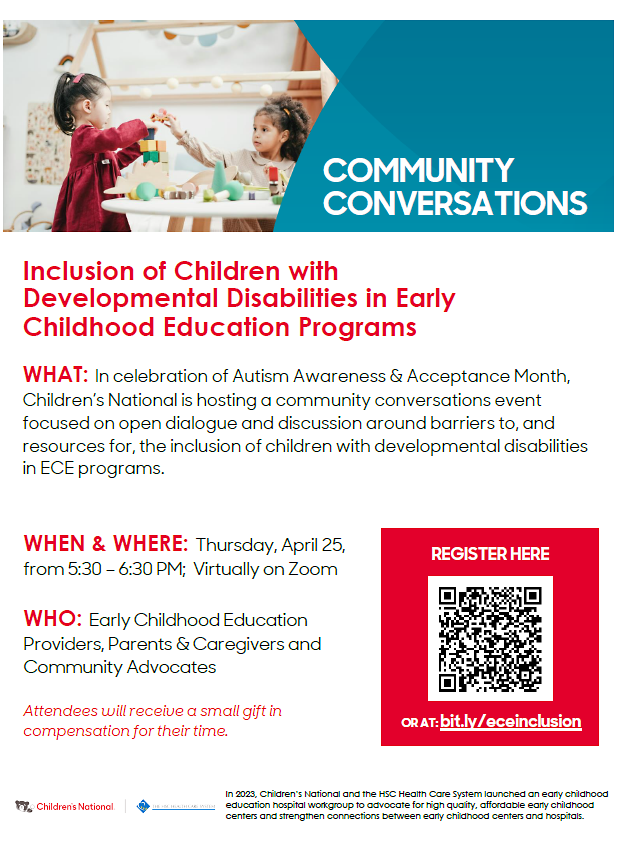Reflections on our Early Childhood Education Workgroup in the First Year
Last spring, Children’s National and HSC Health Care System formed an early childhood education (ECE) hospital workgroup to develop and implement an action plan to build a stronger early childhood education community. Children’s National and HSC 2022-2025 Community Health Improvement Plan includes strategies to change policy, create programs and allocate resources more equitably to improve opportunity for children living in Wards 7 and 8 in Washington, D.C., and Prince George’s County, Maryland—including advocating for high quality, affordable early childhood education centers and strengthening the connections between ECE and hospitals. Our ECE workgroup includes staff who work in clinical and community settings and support programming and policy change efforts through partnerships with ECE centers and early childhood coalitions. The ECE workgroup strategies aim to support and enhance existing hospital-based and community health improvement initiatives while ensuring the voices and needs of residents and leaders are elevated from DC (Ward 7 and 8 neighborhoods) and Prince George’s County, MD neighborhoods that were identified as a priority in Children’s National and HSC 2022 Community Health Needs Assessment.
In our first year, the ECE workgroup focused on the following activities: 1) Conducted a landscape analysis to gather additional information to understand critical needs for our action plan; 2) Connected with ECE providers and parent/caregivers to better understand their needs; and 3) Advocated for more ECE resources through legislation and coalitions.
Conducted a Landscape Analysis to Understand Critical Needs
The ECE workgroup met with individuals with diverse roles across our health care system and leaders from DC and Maryland community organizations to understand current programs and policy efforts to help families locate high quality, affordable childcare resources. Some of the challenges shared were around the high cost of childcare, ECE centers hours not meeting the needs of parents/caregivers’ work schedules, the complexity of the childcare subsidy or voucher requirements, and concerns with ECE centers in providing high-quality care. Additionally, certain populations experience challenges in locating and maintaining placement in ECE centers, including immigrant families, expectant and parenting youth and children that have Autism and other learning disabilities.
Through our ECE workgroup, we identified existing community resources that Children’s National and HSC providers share with parent/caregivers on locating childcare centers and financial assistance that are regularly updated and posted on our Social Work website: Community Resources in Washington, D.C., Maryland and Virginia | Children’s National Hospital (childrensnational.org)
The ECE workgroup also participated in community health fairs and gathered input on what resources and supports families need. To read more about our ECE partnerships, view Lifting Families Up through Partnerships with Early Childhood Education Centers – CHAI News & Views (childrensnational.org)
Connected with ECE Providers and Parents/Caregivers
To help build connections and understanding of the ECE workforce needs, Children’s National attended the Ready At Five’s April 9th School Readiness Symposium in April 2024. The conference included ECE providers from across the state that reviewed the Maryland Early Learning Standards for children ages 0-48 months released earlier in the year. Developed in alignment with the Blueprint for Maryland’s Future legislation and Maryland’s College & Career Ready Standards, the revised standards are organized into five domains and are inclusive, reflecting the latest research on early learners and prioritizing the needs of children with disabilities, multilingual language learners, children experiencing homelessness, and those who have experienced trauma. The Maryland Early Learning Standards are intended to be used as planning guide for ECE administrators and providers in diverse ECE settings.
In April 2024, the ECE workgroup also hosted a virtual Community Conversations on the Inclusion of Children with Developmental Disabilities in ECE programs. More than 40 people participated including parents/caregivers, ECE providers and community partners who provide support to children with Autism and shared their experiences on accessing ECE and resources in the DC metropolitan area.
Advocated for ECE Resources through Legislation and Coalitions
In alignment with our ECE strategy to advocate for high-quality, affordable ECE centers, the ECE workgroup provided written testimony in support of the following Maryland bills in partnership with Austin Morris, Manager of Government Affairs in Maryland at Children’s National:
- Maryland House Bill 377/Senate Bill 419 – Funding for the Therapeutic Child Care Grant Program
- Maryland House Bill 395 – Requiring Prince George’s County Board of Education to require early childhood education programs and childcare centers at certain high schools
- Maryland House Bill 1261 – Establishment of a Commission on Access to High-Quality Early Childhood Education and Child Care for Children Three Years Old and Younger
Although these bills did not pass in the 2024 Maryland Legislative Session, Children’s National will continue to monitor and support advocacy efforts that help to increase ECE resources and supports for ECE providers and parents/caregivers.
ECE workgroup members also participate in local coalitions that are advocating to support the ECE workforce and improve the accessibility, quality and availability of early childhood centers, including the Early Childhood Innovation Network, Zero to Three District of Columbia chapter and DC Autism Collaborative.
Given the challenges that families face in locating an ECE center that meets their individual needs, we published an article on Children’s National Rise and Shine parent/caregiver blog the benefits of enrolling a child in ECE and tips for finding a program that meets their needs: https://riseandshine.childrensnational.org/the-benefits-of-enrolling-children-in-early-childhood-education/
Looking Forward
As we continue to take action on the ECE priority area through our programming and policy advocacy efforts, we are committed to continuing to engage ECE providers and families on understanding how our health care system can support their early educational needs and how to address systemic barriers. We are committed to engaging on the following activities in the next year:
- Monitor the ECE policy and funding landscape.
- Participate in DC Autism Collaborative’s new community resources and support subcommittee launching in January 2024.
- Develop an information sheet on the DC and Maryland childcare subsidy and scholarship program for Children’s and HSC providers that offers step by step with the process.
- Develop parent educational materials to help parent/caregivers with transitioning their child to childcare and to preschool.
- Plan a ECE Community Conversations in fall 2024.
We will post updates to this blog in hopes that we can serve as a resource or inspiration to others working in this space. We are always open to your thoughts and feedback: communityaffairs@childrensnational.org.
Note: All three authors serve as ECE Workgroup Co-leads.
Header photo by Josh Eckstein on Unsplash







